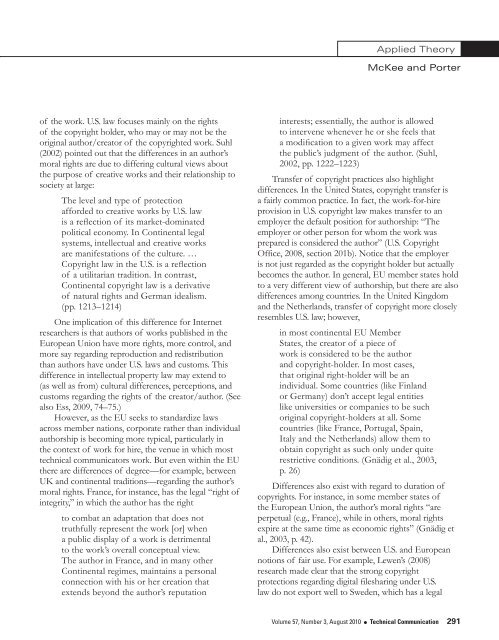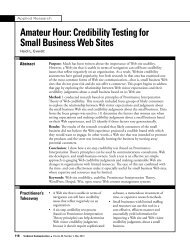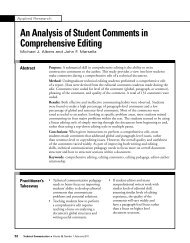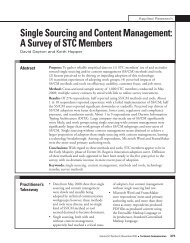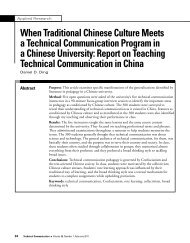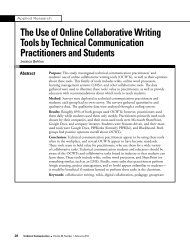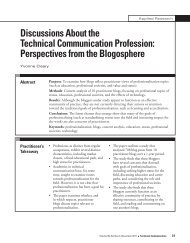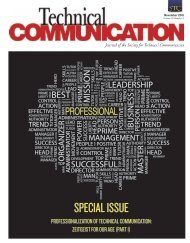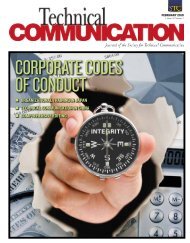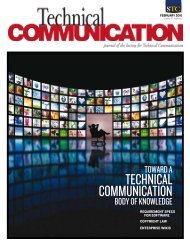Applied TheoryConducting Global Internet Researchof digital networking (Porter, 2009; Rife, 2007). Asresearchers, we must assume that there is a chance(no matter how slim), that our work could be pickedup by a broader audience, perhaps journalists seekinginformation for a newspaper article or governmentagents tracking publications that mention their country.Our work as researchers has the potential to bringgreater scrutiny to communications that otherwisemight not be noticed because of the sheer volume ofonline communications. All researchers should be awareof the potential harm to participants from those whomay read their work, but especially researchers whostudy Internet communications and people’s use of theInternet in countries where government surveillance isan issue. In such countries, Internet research can exposesubjects to a higher degree of risk than in countries witha tradition of freedom of expression.Intellectual Property in a Global ContextA challenge for technical communicators doingInternet-based research is to negotiate intellectualproperty ethics, regulations, and laws in a globalcontext for which a firmly settled or authoritativelegal framework does not yet exist. However, a globalhuman rights perspective is emerging, we believe, as aconsensus standard—albeit a very broad one and onethat is not without some controversy—that can guidetechnical communicators with regard to copyrightquestions related to research.It is beyond the scope of this chapter—and, indeed,our expertise—to attempt an extended discussion ofissues pertaining to international intellectual property. Ingeneral, though, it is important for Internet researchersto realize three key points, articulated by Gnädig,Knorpp, Grosse Ruse, and Giannakoulis (2003), aboutcopying across international intellectual propertyregimes:• Many acts of using copyrighted material are notlimited to the territory of one particular countrybut concern several territories. Therefore they[researchers] should examine which differentnational legislation could possibly be touched bytheir research activities.• In general, at least the law of the country in whichthe act whose copyright legality is in questionoccurs is applicable. This rule applies independentlyof the nationality of the user or the author, andirrespective of where the work was first published.• The distributor needs to take into account all thedifferent copyright laws of the countries in whichdistribution takes place. Only the laws of countriesto which copies are distributed unintentionally canbe left aside. (p. 12)Generally speaking then, according to Gnädig et al.(2003), when researchers copy a work, they are subject tothe laws of the country in which the copying act takesplace. However, when researchers distribute copied work(as may be the case for publication), they—and probablythe publisher—must take into account the copyrightlaws of the countries targeted by the distribution, aprinciple that raises some serious problems for Internetdistributedcontent. In general, for a researcher workingthrough these murky issues of jurisdiction, it is helpfulto take both an international perspective and a globalperspective toward intellectual property issues (Yu,2007a; 2007b).An international perspective takes a comparativeview, looking at the differences among intellectualproperty regimes—culturally and legally, in principleand in practice, and across different national or culturalboundaries. Researchers working with this perspectivemight compare, for instance, the laws and customsin China, where intellectual property is viewed morecommunally, versus those in the United States, where itis viewed more individualistically (at least until a workenters the public domain).An example of the international/comparativeperspective applied to intellectual property matters is theoften-discussed difference between U.S. and EuropeanUnion copyright law with regard to the author’smoral rights. As Suhl (2002) and others have noted,U.S. copyright law does not have a strong establishedtradition of recognizing the author’s moral rights, whileEuropean law and custom do. An author’s moral rightsinclude the right of attribution (i.e., to be credited asauthor of the work); the right to preserve the integrityof the work; and even, in some jurisdictions, the rightto control performance, production, or distribution290 Technical Communication l Volume 57, Number 3, August 2010
Applied TheoryMcKee and Porterof the work. U.S. law focuses mainly on the rightsof the copyright holder, who may or may not be theoriginal author/creator of the copyrighted work. Suhl(2002) pointed out that the differences in an author’smoral rights are due to differing cultural views aboutthe purpose of creative works and their relationship tosociety at large:The level and type of protectionafforded to creative works by U.S. lawis a reflection of its market-dominatedpolitical economy. In Continental legalsystems, intellectual and creative worksare manifestations of the culture. …Copyright law in the U.S. is a reflectionof a utilitarian tradition. In contrast,Continental copyright law is a derivativeof natural rights and German idealism.(pp. 1213–1214)One implication of this difference for Internetresearchers is that authors of works published in theEuropean Union have more rights, more control, andmore say regarding reproduction and redistributionthan authors have under U.S. laws and customs. Thisdifference in intellectual property law may extend to(as well as from) cultural differences, perceptions, andcustoms regarding the rights of the creator/author. (Seealso Ess, 2009, 74–75.)However, as the EU seeks to standardize lawsacross member nations, corporate rather than individualauthorship is becoming more typical, particularly inthe context of work for hire, the venue in which mosttechnical communicators work. But even within the EUthere are differences of degree—for example, betweenUK and continental traditions—regarding the author’smoral rights. France, for instance, has the legal “right ofintegrity,” in which the author has the rightto combat an adaptation that does nottruthfully represent the work [or] whena public display of a work is detrimentalto the work’s overall conceptual view.The author in France, and in many otherContinental regimes, maintains a personalconnection with his or her creation thatextends beyond the author’s reputationinterests; essentially, the author is allowedto intervene whenever he or she feels thata modification to a given work may affectthe public’s judgment of the author. (Suhl,2002, pp. 1222–1223)Transfer of copyright practices also highlightdifferences. In the United States, copyright transfer isa fairly common practice. In fact, the work-for-hireprovision in U.S. copyright law makes transfer to anemployer the default position for authorship: “Theemployer or other person for whom the work wasprepared is considered the author” (U.S. CopyrightOffice, 2008, section 201b). Notice that the employeris not just regarded as the copyright holder but actuallybecomes the author. In general, EU member states holdto a very different view of authorship, but there are alsodifferences among countries. In the United Kingdomand the Netherlands, transfer of copyright more closelyresembles U.S. law; however,in most continental EU MemberStates, the creator of a piece ofwork is considered to be the authorand copyright-holder. In most cases,that original right-holder will be anindividual. Some countries (like Finlandor Germany) don’t accept legal entitieslike universities or companies to be suchoriginal copyright-holders at all. Somecountries (like France, Portugal, Spain,Italy and the Netherlands) allow them toobtain copyright as such only under quiterestrictive conditions. (Gnädig et al., 2003,p. 26)Differences also exist with regard to duration ofcopyrights. For instance, in some member states ofthe European Union, the author’s moral rights “areperpetual (e.g., France), while in others, moral rightsexpire at the same time as economic rights” (Gnädig etal., 2003, p. 42).Differences also exist between U.S. and Europeannotions of fair use. For example, Lewen’s (2008)research made clear that the strong copyrightprotections regarding digital filesharing under U.S.law do not export well to Sweden, which has a legalVolume 57, Number 3, August 2010 l Technical Communication 291
- Page 1 and 2: AUGUST 2010Volume 57 Number 3SPECIA
- Page 3 and 4: PresidentMichael A. HughesVice Pres
- Page 5 and 6: VoLuME 57, NuMBER 3AUGUST 2010ISSN
- Page 7 and 8: Guest EditorialKirk St.Amant and Ma
- Page 9 and 10: Applied ResearchTechnical Communica
- Page 11 and 12: Applied ResearchNicole St. Germaine
- Page 13 and 14: Applied ResearchNicole St. Germaine
- Page 15 and 16: Applied ResearchNicole St. Germaine
- Page 17 and 18: Applied ResearchNicole St. Germaine
- Page 19 and 20: Applied ResearchNicole St. Germaine
- Page 21 and 22: Applied ResearchNicole St. Germaine
- Page 23 and 24: Applied ResearchNicole St. Germaine
- Page 25 and 26: Applied TheoryTatiana BatovaIntrodu
- Page 27 and 28: Applied TheoryTatiana BatovaMoreno,
- Page 29 and 30: Applied TheoryTatiana BatovaThe Uni
- Page 31 and 32: Applied TheoryTatiana Batovadoctors
- Page 33 and 34: Applied TheoryTatiana BatovaTo addr
- Page 35 and 36: Applied TheoryTatiana Batovathe loc
- Page 37 and 38: Applied TheoryTatiana BatovaJohnson
- Page 39 and 40: Applied TheoryTatiana BatovaInterna
- Page 41 and 42: Applied TheoryMcKee and PorterIntro
- Page 43 and 44: Applied TheoryMcKee and PorterFor e
- Page 45 and 46: Applied TheoryMcKee and Porterpubli
- Page 47: Applied TheoryMcKee and PorterBecau
- Page 51 and 52: Applied TheoryMcKee and Porterwith
- Page 53 and 54: Applied TheoryMcKee and PorterA Cop
- Page 55 and 56: Applied TheoryMcKee and PorterConte
- Page 57 and 58: Applied TheoryMcKee and PorterWalto
- Page 59 and 60: Applied ResearchLiza PottsIntroduct
- Page 61 and 62: Applied ResearchLiza Pottsdoes not
- Page 63 and 64: Applied ResearchLiza PottsUser’s
- Page 65 and 66: Applied ResearchLiza Pottsactors, t
- Page 67 and 68: Applied ResearchLiza PottsDRM has a
- Page 69 and 70: Applied ResearchLiza Pottsmake bett
- Page 71 and 72: Applied ResearchLiza PottsOne viewe
- Page 73 and 74: Applied ResearchLiza Pottsinvolved
- Page 75 and 76: Applied ResearchLiza PottsHayhoe, G
- Page 77 and 78: Applied ResearchInternational Fair
- Page 79 and 80: Applied ResearchTyAnna K. Herringto
- Page 81 and 82: Applied ResearchTyAnna K. Herringto
- Page 83 and 84: Applied ResearchTyAnna K. Herringto
- Page 85 and 86: Applied ResearchTyAnna K. Herringto
- Page 87 and 88: Applied ResearchTyAnna K. Herringto
- Page 89 and 90: Book ReviewsWriting Successful Scie
- Page 91 and 92: Book ReviewsThe Process: Business P
- Page 93 and 94: Book ReviewsHCI Beyond the GUI: Des
- Page 95 and 96: Book ReviewsOrigins of the Specious
- Page 97 and 98: Book Reviewsgenre, and process, top
- Page 99 and 100:
Book ReviewsPart One goes from the
- Page 101 and 102:
Book Reviewsrather than writers, an
- Page 103 and 104:
Book ReviewsHow to Write Fast Under
- Page 105 and 106:
Book Reviewsmanagement system (CMS)
- Page 107 and 108:
Book Reviewsnearly strangled when h
- Page 109 and 110:
Book Reviewsinteractive TV model)
- Page 111 and 112:
Book ReviewsOtherwise, Beech shows
- Page 113 and 114:
Book Reviewssuch as blog, I found m
- Page 115 and 116:
Book Reviewsemployees and effective
- Page 117 and 118:
Recent & RelevantSherry Southard, E
- Page 119 and 120:
Recent & RelevantRecent & RelevantC
- Page 121 and 122:
Recent & RelevantRecent & RelevantE
- Page 123 and 124:
Recent & Relevantworking in a langu
- Page 125 and 126:
Recent & RelevantWhat’s the big d
- Page 127 and 128:
Recent & RelevantScientific Writing
- Page 129 and 130:
Recent & Relevantapplicability. Man
- Page 131:
Did You Missthe Summit?Don’t miss


